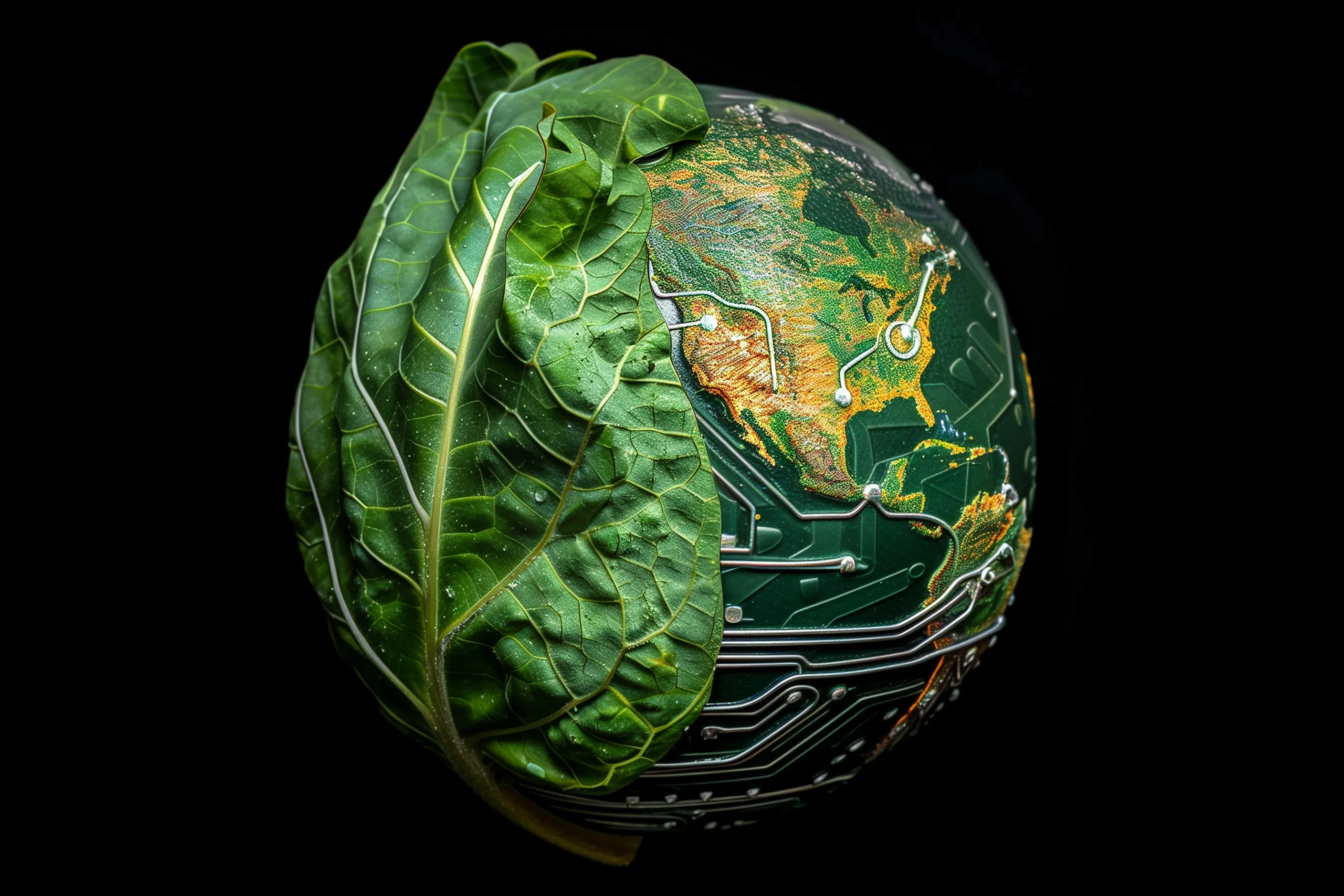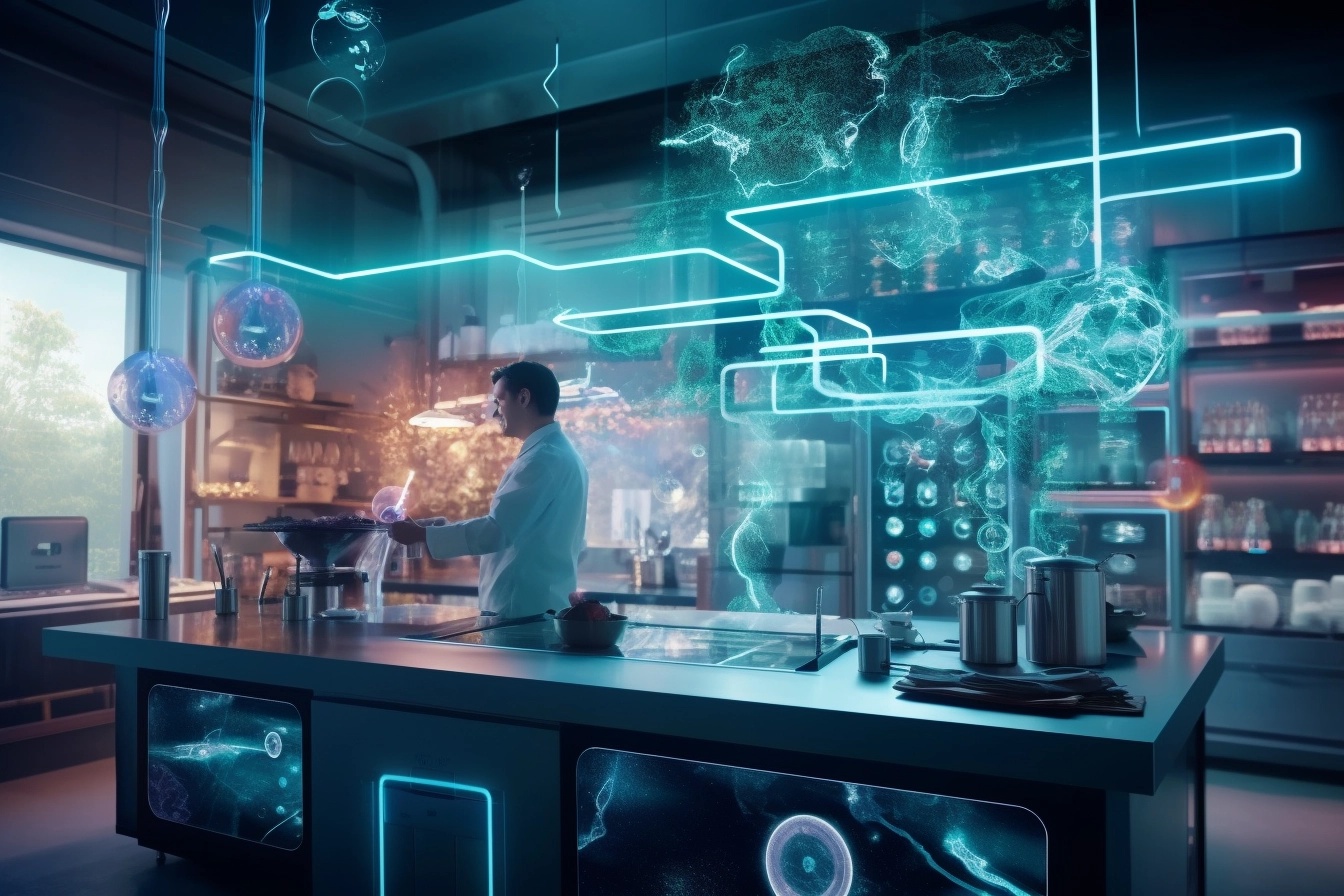published February 19, 2024 | 7 min read
In an age where the urgency for sustainability intersects with the rapid advancement of technology, the role of Artificial Intelligence (AI) in revolutionizing food-sourcing practices has emerged as a beacon of innovation. This deep dive into AI’s impact on sustainable gastronomy unveils how technology not only meets the current demands of the culinary industry but also paves the way for a more sustainable and efficient future.
The AI Revolution in Food Sourcing
The integration of Artificial Intelligence (AI) into food sourcing marks a pivotal shift towards leveraging technology for sustainability. AI’s capability to process and analyze extensive datasets surpasses the traditional methods of human analysis, unlocking new avenues for sustainable sourcing practices that were once considered beyond reach. This advancement is not just about technology’s infiltration into the culinary realm; it’s a bold step towards revolutionizing how we approach sustainability in food production and sourcing.
AI algorithms excel in identifying patterns and predicting outcomes with precision, which has transformative implications for the agricultural and food sourcing sectors. By deploying AI-driven analytics, stakeholders can pinpoint sustainable sourcing opportunities that align with environmental conservation goals.

a high-tech farm tended by autonomous drones
Case Studies: AI at the Forefront of Gastronomy
Expanding on the transformative potential of AI in gastronomy, let’s delve into some case studies that highlight AI’s pivotal role in sustainable food sourcing. These examples underscore the versatility and power of AI in enhancing efficiency, sustainability, and innovation within the food industry.
Predictive Analytics in Crop Management
One notable instance involves the use of AI to forecast agricultural outputs more accurately. By leveraging weather data, soil conditions, and historical crop performance, AI models can predict crop yields with unprecedented precision. This not only aids in better planning and allocation of resources but also minimizes food waste significantly by aligning production closely with market demand. An example of this is a project by a major agricultural technology firm that implemented machine learning algorithms to provide farmers with real-time advice on planting times, crop rotation, and optimal harvesting periods.




tablet displaying complex data analytics
Eco-Friendly Supplier Selection
Another area where AI shines is in the selection of eco-friendly suppliers. By analyzing data related to suppliers’ practices, including their carbon footprint, water usage, and adherence to sustainable farming practices, AI algorithms can recommend the most environmentally responsible suppliers. For instance, a startup has developed an AI-powered platform that evaluates suppliers across several sustainability metrics, offering businesses insights into the most eco-conscious choices for their supply chain needs.
Reducing Transportation Emissions
AI also plays a crucial role in optimizing logistics and reducing transportation emissions. By analyzing routes, traffic patterns, and delivery schedules, AI can optimize delivery routes, thereby minimizing fuel consumption and reducing carbon emissions. A leading logistics company utilized AI to overhaul its delivery network, resulting in a significant decrease in miles driven and a corresponding reduction in CO2 emissions.
different stages of the food supply chain
Water Usage Optimization
Water scarcity is a growing concern globally, and AI is at the forefront of addressing this issue in agriculture. Through the use of sensors and AI algorithms, farming operations can now precisely monitor water usage, ensuring crops receive exactly what they need without wastage. An agricultural AI startup has pioneered a system that combines soil moisture sensors with AI to provide real-time irrigation recommendations, conserving water and improving crop yields.
Enhancing Biodiversity Through AI Insights
AI’s data analysis capabilities extend to biodiversity conservation. By monitoring ecosystem health, identifying threats to biodiversity, and predicting the impact of agricultural practices on local wildlife, AI-enabled platforms can guide farmers towards practices that protect and enhance biodiversity. A conservation organization has employed AI to map biodiversity hotspots and prioritize conservation efforts, helping to maintain ecological balance while supporting sustainable agriculture.
Elevating Supply Chain Transparency through AI and Blockchain
The quest for sustainability in the culinary world increasingly hinges on supply chain transparency. The advent of AI technologies, paired with blockchain, introduces an unparalleled level of visibility into the origins, transportation, and storage conditions of food products. This symbiosis between AI and blockchain technology not only guarantees the veracity of data but also empowers both consumers and businesses to make more environmentally informed decisions. By ensuring that every stakeholder has access to transparent and reliable information, these technologies are setting a new standard for accountability and sustainability in food sourcing.
Culinary Innovation with AI: Crafting the Sustainable Menu
Beyond its implications for sourcing, AI is reimagining culinary creativity, allowing chefs to explore and innovate with sustainability at the forefront. AI’s role extends into the kitchen, where it aids in the development of plant-based dishes that faithfully replicate traditional flavors, and in optimizing menus to reflect sustainable practices. This technological intervention enables chefs to push the boundaries of eco-conscious cuisine, ensuring that sustainability does not come at the expense of taste and culinary experience.




a chef interacting with a holographic AI interface
Navigating the Challenges and Ethical Landscape
Despite the promising horizon, the integration of AI in achieving sustainable food sourcing presents its own set of challenges and ethical dilemmas. Concerns surrounding data privacy, the widening digital divide, and the potential displacement of workers in traditional agriculture underlines the need for a balanced and ethical approach to technology adoption. The deployment of AI in food sourcing must be guided by principles that ensure fairness, equity, and respect for all participants in the food supply chain. This holistic approach calls for collective efforts from technology developers, policymakers, and the global community to ensure that the fruits of AI advancements are shared across societies.
Envisioning the Future: AI’s Expanding Role in Sustainable Gastronomy
The trajectory of AI in the realm of sustainable food sourcing is set to deepen, with future innovations like precision agriculture and AI-enhanced predictive models promising to further revolutionize this space. These advancements aim to refine the use of resources—such as water, fertilizers, and pesticides—while also offering strategies to mitigate the effects of climate change on food production. The potential of AI to contribute to food security and environmental stewardship underscores a future where technology and sustainable practices go hand in hand, ensuring a resilient and prosperous culinary world for generations to come.




AI device analyzing the meal’s sustainability score
Conclusion: Towards a Sustainable Culinary Future with AI
The journey toward integrating AI into sustainable food sourcing is marked by both promise and complexity. As we stand at this juncture, it’s evident that AI has the potential to dramatically transform the culinary landscape, making it more sustainable, efficient, and innovative. The path forward requires not just technological innovation but a shared commitment to ethical practices, ensuring that the benefits of AI are equitably distributed. By embracing the power of AI, we stand on the cusp of a new era in gastronomy—one that values the health of our planet as much as it does flavor and culinary excellence. This vision for a sustainable gastronomic future, guided by AI, is not just achievable; it’s essential for the well-being of our planet and future generations.









